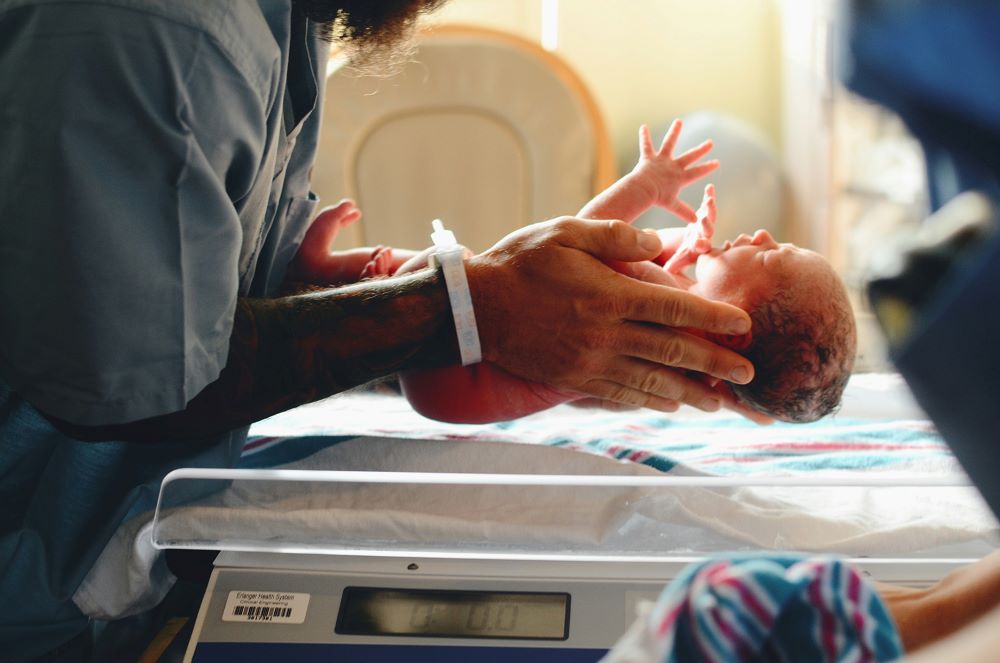
(RNS/Unsplash/Christian Bowen)
Christina Marea, a nurse midwife, wasn't surprised when she saw the report from National Nurses United warning that Ascension, one of the largest Catholic health care providers in the U.S., was accelerating a trend of slashing labor and delivery units from its offerings.
In 2017, Ascension closed the labor and delivery unit at Providence Hospital in Washington, where Marea worked. Marea said that Ascension gave 60 days' notice of the closure without coordinating with nearby facilities to make sure they could handle increased patient volume or creating a transfer plan for patients, simply handing them a list of hospitals.
Marea, now an assistant professor in midwifery at Georgetown University's School of Nursing, said that Ascension had underinvested in Providence for years before the closure.
She remembers nurses begging Ascension for more than two baby warmers for the 12-bed unit. "We would have nurses running down the hallway, sterilizing them while they ran to get from one delivery to the next," she said.
Providence served Black and poor patients and had the only labor and delivery unit with 24/7 access to a Spanish-speaking provider, according to Marea.
But when Ascension closed the unit, two years before it closed the hospital entirely, Marea said, "it was devastating."
While labor and delivery units are disappearing at hospitals nationally, some health care experts have pointed out that Ascension has the resources to buck that trend. Both industry analysts and the nonprofit's obstetric nurses are questioning whether Ascension is upholding Catholic values and those of the U.S. Catholic bishops who called for more robust maternity care before the 2022 Dobbs ruling ended the right to an abortion.
The labor and delivery closures do not "represent a culture of life that the Catholic Church and the Catholic health facilities are promoting," said Marea.
"Historically, the Catholic hospitals have had a better reputation, mostly because of their mission," said Jean Ross, a co-president of National Nurses United, a union that recently began representing Ascension nurses in Baltimore; Austin, Texas; and Wichita, Kansas.
Ascension closed labor and delivery departments at a higher rate than the national average from 2012 to 2021, according to a January report by the union, and to date has shuttered more than 26% of its units that existed in 2012. The closures disproportionately occurred in areas with high poverty rates and in Black and Latino communities, according to NNU's research, populations that already face higher infant and maternal mortality.
The system's mission statement, citing "the loving ministry of Jesus as healer," says it is dedicated "to serving all persons with special attention to those who are poor and vulnerable."
Ascension, which in recent years has had upwards of $15 billion in cash reserves, had been accused of other strategic decisions that prioritized profitability over the system's mission. Pointing to closures of "safety-net hospitals" and its outside investments, STAT News characterized Ascension in 2021 as "moonlighting as a private equity firm."
Ge Bai, professor of accounting and health care policy and management at Johns Hopkins University, said that hospitals intent on maximizing profitability will make cuts to low-margin obstetrics and gynecology services, especially where many patients are on Medicaid.
A 2022 New York Times investigation revealed that Ascension's executives get paid more when the system has higher excess revenue. Those strong financial metrics allow Ascension to expand further.
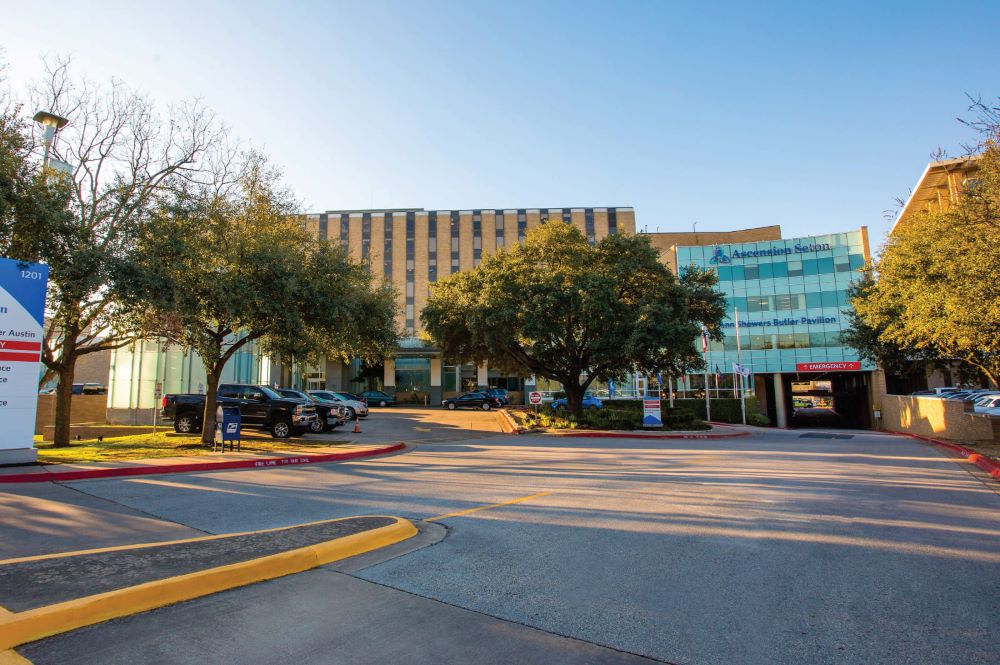
A NICU nurse at Ascension Seton Medical Center in Austin, Texas, said the hospital recently stopped translating discharge or consent papers into Spanish. Ascension health care system is one of the largest Catholic health care providers in the U.S. (RNS/Courtesy of Ascension)
Judith Garber, a senior policy analyst at the Lown Institute, a nonpartisan think tank, said Ascension's investments in health care businesses, including medical debt collection "while hospital services were struggling, shows a lot about their priorities."
A 2020 report by Community Catalyst, a health care advocacy organization, found that, in general, Medicaid-insured patients make up only 7.2% of discharges at Catholic hospitals, compared to 8.3% at other nonprofit hospitals and 13.6% at public hospitals.
The NNU report stated that at Ascension, charity care accounts for 1.9% of operating expenses, below the 2.6% national average.
Ascension did not provide RNS with its charity care percentages, but its administrators disputed the narrative of NNU's report, calling maternal and perinatal care, especially for poor and vulnerable people, a "cornerstone" of Ascension's work.
Dr. Richard Fogel, Ascension's executive vice president and chief clinical officer, said the number of babies born in the company's hospitals has been relatively stable for the last five years despite declining birth rates, with Ascension delivering about 1 in 50 U.S. babies in 2023.
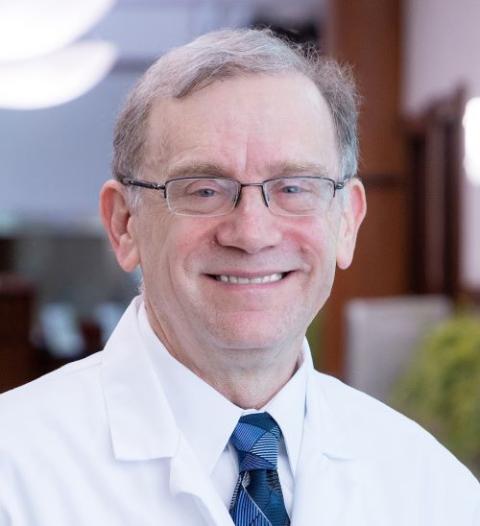
Dr. Richard Fogel is Ascension's executive vice president and chief clinical officer. (RNS/Courtesy of Ascension)
Fogel said that department closures are made with the goal of providing the best care as they see more high-risk pregnancies and fewer births. "In medicine, it's a general truth that the more you do as a provider or facility, the better you are, especially when it comes to complex cases," he said.
Dr. Thomas Aloia, senior vice president and chief medical officer at Ascension, also told RNS that closed units "led to access to better care."
An Ascension spokesperson said, "Ascension strongly outperforms national averages for all maternal and infant clinical measures, including neonatal mortality. Our outcomes for Black and African American patients are better than the national average."
But Dr. Jerrelyn J. Inocencio-Diaz, an OB-GYN and a clinical instructor at Kaiser Permanente School of Medicine, told RNS in an email that, while practical in theory, consolidating labor and delivery limits access to care for many patients, who can no longer find beds or appointments or have trouble teaching remaining hospitals.
"In times of emergency, distance may preclude a patient from accessing timely care which could result in dire consequences," Inocencio-Diaz said.
"Numerous studies have documented racial disparities in obstetric care. This decision will further widen them," Inocencio-Diaz added. "Consolidating (labor and delivery) services in fewer hospitals with more specialized staff will negatively impact obstetric care in lower socioeconomic communities."
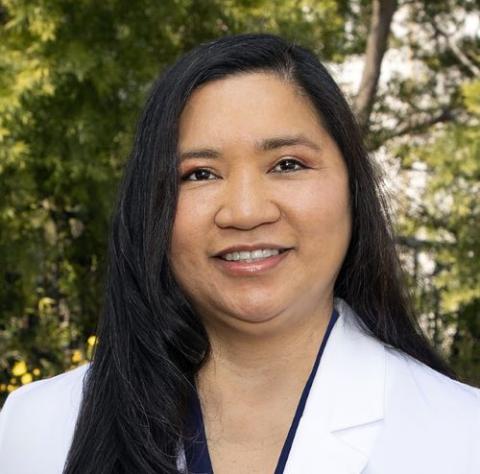
Dr. Jerrelyn Inocencio-Diaz is an OB-GYN and a clinical instructor at Kaiser Permanente School of Medicine. (RNS/Courtesy photo)
Closures are not the only problem Ascension nurses have become alarmed about. Several told RNS that they have seen a pattern of reduced services and a lack of information for pregnant patients, new mothers and babies.
Vanessa Villarreal, a NICU nurse at Ascension Seton Medical Center in Austin, Texas, said her hospital recently stopped translating discharge or consent papers into Spanish, now providing them to patients only in English in a city where 30% of residents do not speak English at home. Instead the hospital uses "unreliable" interpretation programs on iPads.
Villarreal also said the system has not done enough to tell patients that there is no labor and delivery at a nearby Ascension medical center. When a mom in pre-term labor mistakenly shows up and gives birth there, two medical teams are needed to transfer the mom and premature baby to further care, separating them. "is a traumatic experience," said Villarreal.
Marvin Ruckle, a NICU nurse who has worked at Via Christi St. Joseph hospital facility in Wichita for more than three decades, said that when Ascension took over in 2013, "they started cutting services," eliminating even the simplest surgeries in the NICU and sending patients and their parents three hours away for that care.
Recently, Ruckle said, Ascension cut his NICU's brain-scanning electroencephalogram services and depends on another hospital's technicians. Parents and clinicians sometimes wait 10 hours or more to find out if a baby that has stopped breathing temporarily has experienced brain damage.
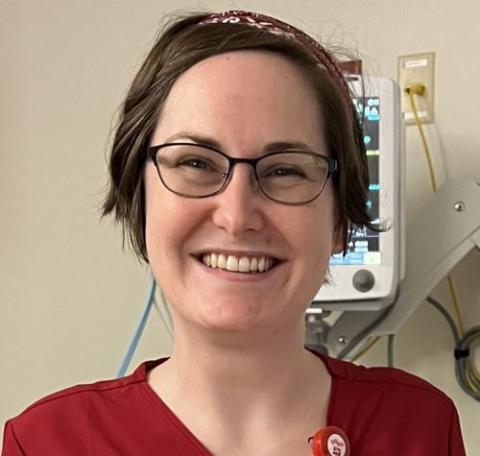
Nicki Horvat is a NICU nurse at Ascension St. Agnes Hospital in Baltimore. (RNS/Courtesy of National Nurses United)
Nicki Horvat, a NICU nurse at Ascension St. Agnes Hospital in Baltimore, said that nurses on her unit "very often" have three patients, instead of the recommended two. In the mother-baby unit, where one nurse cares for both patients, Horvat said that nurses haven't been adequately trained to care for the baby's and mom's different needs. Meanwhile, each nurse is assigned four or five pairs — or eight to 10 patients.
"Unfortunately, the people who suffer the most are the babies, because they can't voice their needs," Horvat said.
Horvat and Villarreal both said they hoped Catholic leaders would speak up and support the nurses in asking Ascension to fulfill its mission.
"It's really important for leaders in the Catholic Church to come and call on Ascension to do more for these communities and for your staff," said Villarreal, a Catholic mom.
Since RNS spoke with Villarreal, her union with NNU signed its first contract with Ascension, which included minimum staffing ratios in the NICU and other hospital units and a process to resolve staffing disputes.
While Ascension hospitals are subject to larger forces reshaping American health care, as a Catholic entity, Ascension is also subject to the oversight of local bishops and a sponsor accountable for ensuring that the church's mission is carried out.
Historically, Ascension's sponsors have been congregations of religious sisters and brothers. Today, the sponsor is a group of lay people and vowed religious whose identities Ascension declined to share.
Catholic health care institutions and their sponsors are in turn guided by a document created by the U.S. bishops' conference called Ethical and Religious Directives, or ERDs, which provide "authoritative guidance on certain moral issues that face Catholic health care today."
The ERDS cover a broad range of procedures and ethical principles, including guidance on maternal and newborn care. The current ERDs say, "A Catholic health care institution should provide prenatal, obstetric, and postnatal services for mothers and their children in a manner consonant with its mission."

(RNS/Unsplash/Visualss)
The Rev. Charles Bouchard, former senior director of theology and sponsorship at the Catholic Health Association of the United States, told RNS that the bishops' role is primarily advocacy and encouragement.
"They can keep hospitals from doing something if it's seen as at odds with Catholic teaching. But they can't, unless they're going to pay for it, they can't go out and say, 'you've got to keep this hospital open,' " said Bouchard, who was previously vice president of theological education at Ascension.
Emily Reimer-Barry, associate professor of theology and religious studies at the University of San Diego, said, "If (hospital administrators) can make a case that these decisions are rooted in their good faith interpretation of the directive, then they probably wouldn't get much pushback."
On the other hand, "if the bishops were absolutely certain that what Ascension was doing was not in alignment with the directive, then they would intervene, not necessarily publicly," she said.
Citing the resources used for the National Eucharistic Congress and pro-life, anti-abortion lobbying, Reimer-Barry said that "the bishops could do a lot more than what they're doing."
Bishops have taken extraordinary steps to enforce the ERDs, though it is rare. In 2010, Phoenix Bishop Thomas Olmsted removed the Catholic status of a hospital after administrators approved an abortion when doctors said the patient's life was at risk. The Catholic sister who was vice president for mission integration was briefly excommunicated.
Advertisement
RNS contacted the local bishops for every diocese where Ascension has closed a labor and delivery department since 2012 without subsequently closing the hospital entirely. The survey did not reveal any instances in which a bishop had intervened to stop a labor and delivery unit from closing.
The Archdioceses of Austin, Chicago, Detroit, Indiana and Milwaukee, and the Dioceses of Austin, Birmingham, Green Bay, Lafayette in Indiana and Wichita did not respond to a request for comment.
The Diocese of St. Augustine and the Diocese of Pensacola-Tallahassee referred RNS to Ascension.
The U.S. bishops' conference has been similarly silent in the face of the closures. When RNS asked the bishops' communications office for an interview about Ascension's hospital closures, Chieko Noguchi, a spokesperson, referred RNS to the Catholic Health Association of the United States, which represents Catholic health care providers. CHA did not respond.
The chairs of the U.S. bishops' conference's committees on doctrine, which oversee the ERDs and pro-life activities, did not respond to a request for comment. The chair of the subcommittee on health care issues declined a request for comment.
In the spring of 2022, as the bishops prayed for a favorable ruling in Dobbs v. Jackson Women's Health Organization, nine bishops who headed key committees for the bishops' conference publicly urged Catholic institutions to "be witnesses of love and life by expanding and improving the extensive network of comprehensive care including pregnancy help centers, maternity homes, and Catholic health care and social service agencies."
Since then, Ascension has closed six labor and delivery departments, leaving Ascension with just 49 birthing units at its approximately 140 hospitals.







